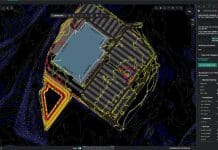
Tool and plant theft from vehicles and sites has increased by around 50% in the last two weeks, as construction sites shut and scale down in the face of COVID-19
The Construction Equipment Association (CEA), owners of the CESAR scheme – the plant marking and registration initiative – has reported a marked increase in plant and tool theft from both vehicles and site compounds due to COVID-19 site closures.
David Smith, chairman of the Combined Industries Theft Solutions (CITS), said: “As a result of the coronavirus situation, some construction sites have been forced to close, and personnel, including on-site security, have left. Under these circumstances, organised criminal gangs may try to exploit the situation.
“Where construction plant and equipment has been left on-site, it is hoped that the police will be as vigilant as ever. Any unusual activity, on or near construction sites which have closed, needs to be investigated. This also applies to any unusual transport movements for construction plant, for example, during an unusual time, or if the vehicle is moving numerous items of plant belonging to different companies.
“For owners of construction plant, it may be useful, for example, to ensure that tracking companies are alerted to the plants’ location.”
Smith added: “With all sectors working together, we will have a better chance of preventing crime during this time.”
‘Open season’ for criminal gangs
Nick Mayell, Datatag’s CESAR Police training and liaison officer and security expert, said: “The coronavirus ‘lockdown’ has meant that it’s currently ‘open season’ for criminal gangs who target construction plant.
“The abrupt abandonment of work-sites has left machinery unsecured and vulnerable. Whereas a company would normally ‘wind-down’ for seasonal closures by ‘off-hiring’ kit and moving their own machines – sites have closed overnight – in the blink of an eye – and the thieves are having a field day.”
Mayell added: “The shifting of kit has also become much easier as trucks and vans are moving freely during the lockdown where car travel is restricted to ‘essential’.”
Remove tools and plant equipment from sites
Firms should aim to remove the majority of tools and plant away from site compounds, advised Ian Elliott, group head of security, Clancy Docwra and CITS vice chairman.
He added: “Where traditionally companies would perhaps have used plant containers – during these challenging times – companies are advised to leave these almost empty and remove plant and tools to a head-office, where possible, or placing the tools and small kit, within brick or concrete buildings well out of sight of the criminals.
“For sites where a company can’t physically remove kit – then the machinery should be placed within containers and for the containers to be blocked in by placing large concrete blocks or vehicles in front of the containers – blocking the doors. Keys for the vehicles must not be left on site!”
DC Chris Piggott, rural vehicle crime intelligence officer at the National Vehicle Crime Intelligence Service (NAVCIS), advised: “Many construction and agricultural vehicles now have so-called smart keys containing electronic information needed to start the machine, so it’s vital that keys are removed from machines and stored securely in a remote location.
“Other measures include the CESAR marking and registration system, immobilizers and tracking devices which are effective in deterring thieves and aiding police recoveries.”
Other advice for contractors with higher risk sites include:
- Investing in active CCTV is advisable for sites considered as high-risk – active CCTV uses analytic cameras that alert a monitoring centre if the cameras detect movement on the site out of hours
- Companies should also review their ‘hired in terms and conditions’ in order to protect their business
Elliott said: “It’s pointless having CCTV unless it’s the active type – as all this does is add insult to injury the following morning when you watch the footage of your equipment being loaded into someone else’s van and stolen.
“Some companies are beginning to invest in thermal imaging cameras, which reduce the number of false alarm events relating to CCTV on sites these, rather than detecting movement, use body heat monitoring. The camera easily picks up the body heat of any human walking across a site.”
Elliott added: “Only hire in equipment that has CESAR or micro CESAR fitted, and is installed with immobilisers and a tracking device as standard. If the hire company cannot prove the fitting or installation any of these mentioned security measures, and the equipment is subsequently stolen, then this would be at the hire companies own risk.”
Delay in new Agricultural Construction Equipment police unit
COVID-19 has not only impacted on the increase in Plant theft – but the situation is also partly responsible for the delay in launching the new Agricultural Construction Equipment national police unit.
The CEA is still progressing agreements with the police and key insurers to support a new Agricultural Construction Equipment (ACE) national police unit, which will be the successor for the original Plant & Agricultural National Intelligence Unit (PANIU).
The announcement has now been postponed until 1 October 2020.
Rob Oliver, chief executive CEA, commented: “The good thing is that, although the new national police unit is delayed, there is still active industry/police co-operation going on. This is made possible by the expertise of the CESAR Police Liaison Team, CITS and others stepping up their services to combat this crime wave.
“Police officers may have other urgent concerns at present, but the 24/7 CESAR call centre remains as a quick check resource for them when they need to identify suspicious plant. At the moment, it is all about working together to help protect our people and our businesses.”














